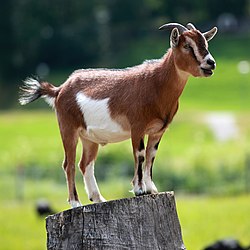やぎ
Jump to navigation
Jump to search
Japanese[edit]
Etymology 1[edit]
| Alternative spelling |
|---|
| 柳 |
From Old Japanese. First attested in the Man'yōshū of 759.[1]
Ultimate derivation unclear. Theories include:
- Shorter form of やなぎ (yanagi, “willow”), omitting the medial な (na).[1][2]
- From Middle Chinese 楊 (MC yang) + 木 (ki, “tree”).[1]
- From Middle Chinese 楊 (MC yang) + い (i, possible epenthesis; see also development of 銭 (zeni) from older sen), with resultant /jiaŋi/ realizing in Japanese phonology as yagi.[1][2]
Generally only found in compounds.
Pronunciation[edit]
- Pitch accent depends on the compound word
Noun[edit]
Further reading[edit]
- Entry at Nihon Jiten (in Japanese)
Etymology 2[edit]
| Alternative spellings |
|---|
| 山羊 野羊 (less common) |

Ultimate derivation unclear. Theories include:
- Shift from 野牛 (yagyū, “wild cattle”), from a vague resemblance between the two creatures.
- From Middle Chinese 羊 (MC yang) + い (i, possible epenthesis; see also development of 銭 (zeni) from older sen), with resultant /jiaŋi/ realizing in Japanese phonology as yagi.
Might only be attested in Japanese since 1523.[3]
The kanji spellings, either 山 (“mountain”) + 羊 (“sheep”) or 野 (“field; wild”) + 羊 (“sheep”), are examples of jukujikun (熟字訓).
Pronunciation[edit]
Noun[edit]
- [from 1523?] a goat (animal)
- 2000 April 20, “深き森の長老 (fukaki mori no chōrō) [Elder of the Deep Woods]”, in Magic Ruler -魔法の支配者-, Konami:
- 昔から森に住んでいる白ヤギ。真の姿は森の長老。
- Mukashi kara mori ni sundeiru shiroyagi. Shin no sugata wa Mori no Chōrō.
- A white goat who has dwelt in the woods since ancient times. Its true visage is as an Elder of the Woods.
- 昔から森に住んでいる白ヤギ。真の姿は森の長老。
Usage notes[edit]
As with many terms that name organisms, this term is often spelled in katakana, especially in biological contexts (where katakana is customary), as ヤギ.
Further reading[edit]
- Entry at Nihon Jiten (in Japanese)
Etymology 3[edit]
The reading of various names.
Pronunciation[edit]
Definitions[edit]
| For pronunciation and definitions of やぎ – see the following entries. | ||
| ||
| ||
| (This term, やぎ, is the hiragana spelling of the above terms.) For a list of all kanji read as やぎ, see Category:Japanese kanji read as やぎ.) |
(The following entries are uncreated: 矢木, 八記, 八樹, 矢儀, 八代, 野寄, 矢樹, 屋木, 柳吉, 矢城, 八鬼, 谷木, 八城, 矢来, 箭木.)
References[edit]
- ↑ 1.0 1.1 1.2 1.3 “柳”, in 日本国語大辞典 (Nihon Kokugo Daijiten, “Nihon Kokugo Daijiten”)[1] (in Japanese), concise edition, Tōkyō: Shogakukan, 2000
- ↑ 2.0 2.1 2.2 Matsumura, Akira, editor (2006), 大辞林 [Daijirin] (in Japanese), Third edition, Tōkyō: Sanseidō, →ISBN
- ^ “山羊・野羊”, in 日本国語大辞典 (Nihon Kokugo Daijiten, “Nihon Kokugo Daijiten”)[2] (in Japanese), concise edition, Tōkyō: Shogakukan, 2000
- ^ NHK Broadcasting Culture Research Institute, editor (1998), NHK日本語発音アクセント辞典 [NHK Japanese Pronunciation Accent Dictionary] (in Japanese), Tōkyō: NHK Publishing, →ISBN
- ^ “2002043185c5Zk53lv91”, in 日本国語大辞典 (Nihon Kokugo Daijiten, “Nihon Kokugo Daijiten”)
 [3] (in Japanese), 2nd edition, Tōkyō: Shogakukan, 2000, released online 2007, →ISBN, concise edition entry available here (Note: Dialectal meanings, etymological theories, pronunciation including modern, dialectal, and historical information, Jōdai Tokushu Kanazukai, historical dictionaries containing this word, and the kanji spellings in those dictionaries have been omitted.)
[3] (in Japanese), 2nd edition, Tōkyō: Shogakukan, 2000, released online 2007, →ISBN, concise edition entry available here (Note: Dialectal meanings, etymological theories, pronunciation including modern, dialectal, and historical information, Jōdai Tokushu Kanazukai, historical dictionaries containing this word, and the kanji spellings in those dictionaries have been omitted.)
